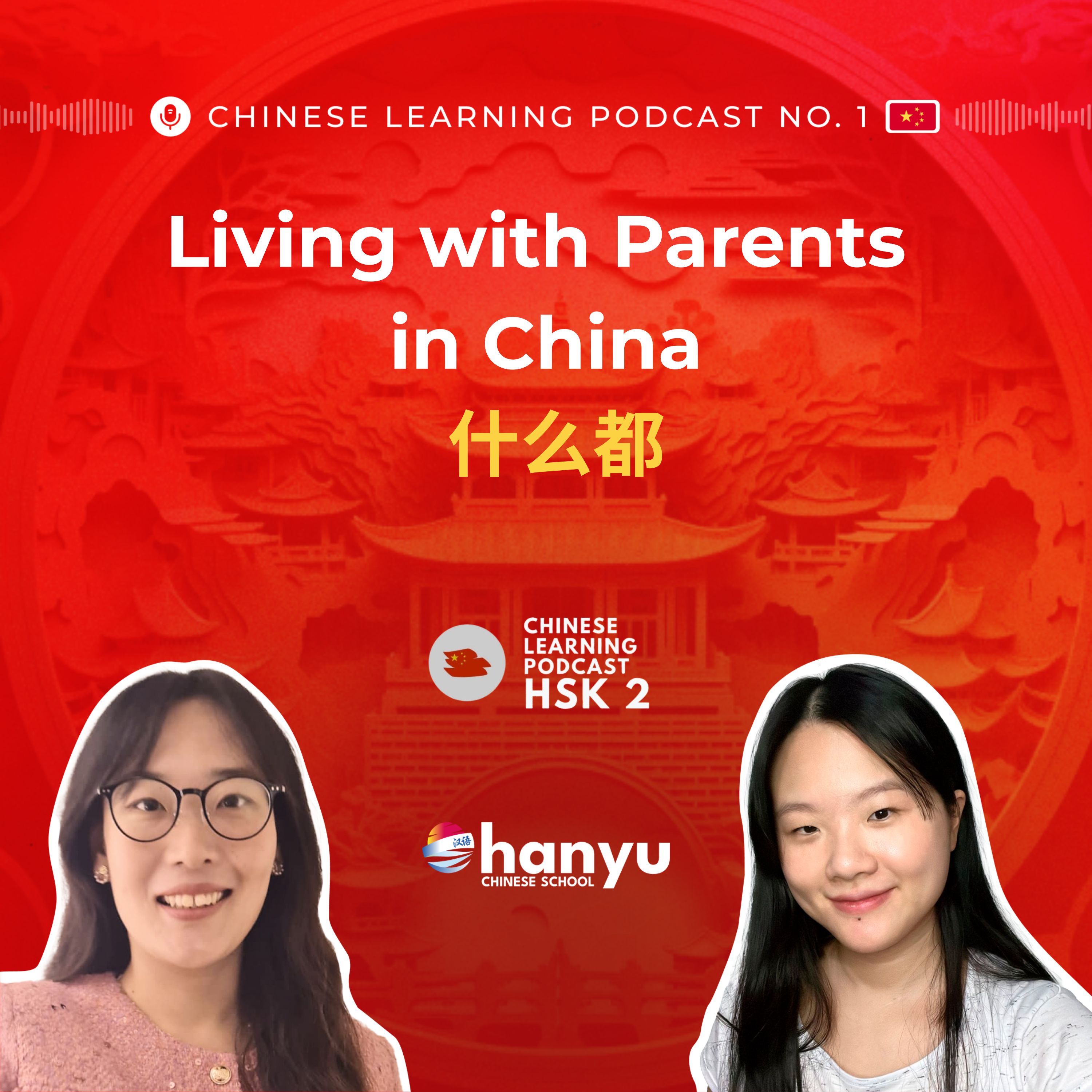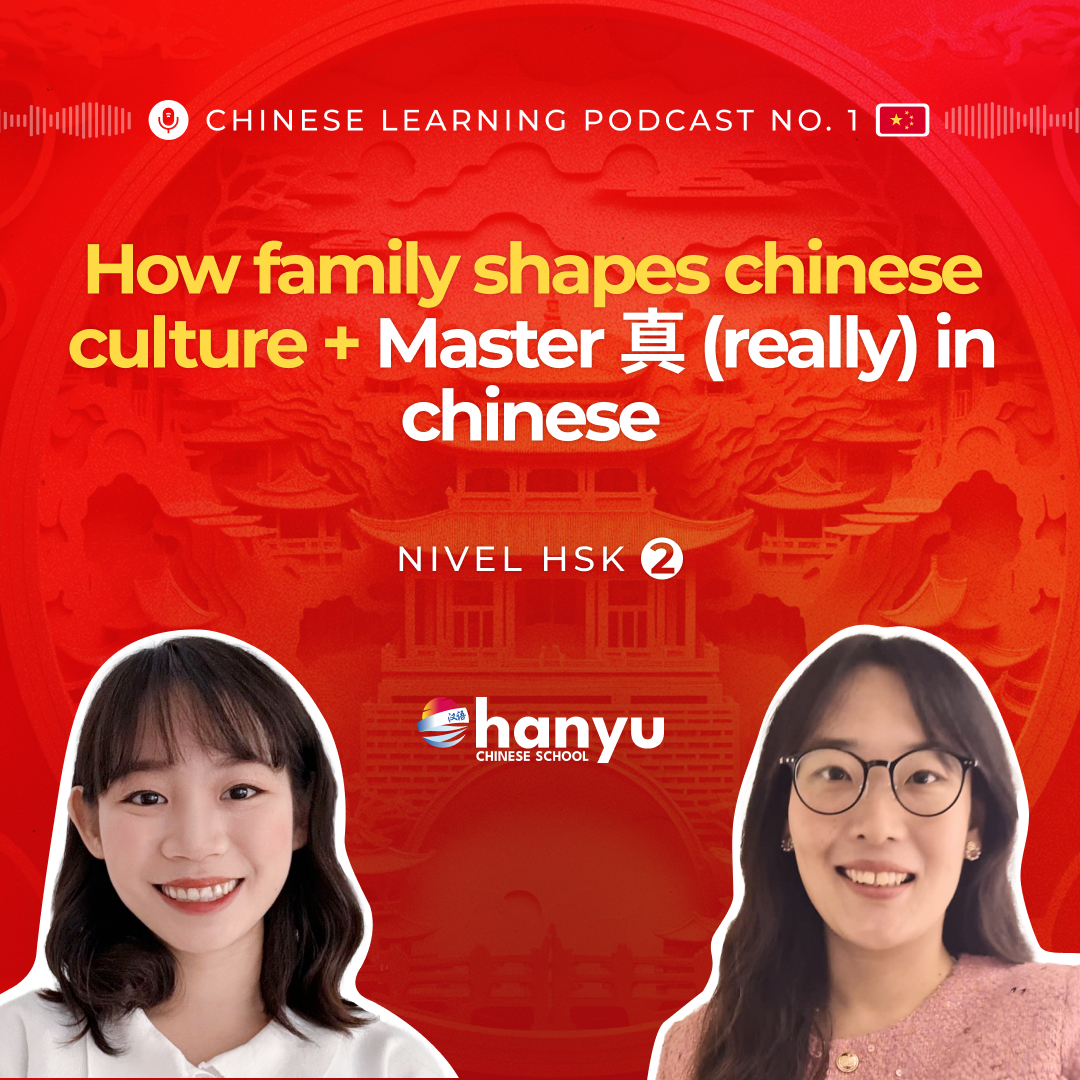Episode Transcript
[00:00:00] Speaker A: Foreign.
Hey, everyone.
Welcome back to the HSK2 podcast as Euro. I'm your friend Melanie, and today with me is our amazing old friend, Emily.
[00:00:28] Speaker B: Hi, Melanie. I'm doing awesome.
Ah, great.
So I'm super excited. For today's episode, we are diving into some very useful Chinese grammar that will make your conversation smoother and more natural.
We say this a lot. I know, I know, but so today we have a special magical word that we're gonna teach you.
[00:01:01] Speaker A: Yes. So today we will be talking about the structure, which is great for describing how something is done and the result of an action.
Plus, we'll explore a very fun and fascinating cultural topic that ties into how we express actions in Chinese.
[00:01:24] Speaker B: So you will love this one. And grab your notes or just listen closely because this episode will make you, will make you feel happy. Your Chinese will sound even more native. Right?
[00:01:39] Speaker A: For sure.
[00:01:41] Speaker B: Okay, so before we start, you are listening to the Honey Chinese podcast.
If you are learning Chinese and want to take your skill to the next level, you're gonna love this episode. Love this podcast. And if you'd like to learn more with us, you can try a free one on one class through our platform. So, like, here you can see our link.
We have courses starting from €39 with live classes, recorded classes, and full access to our online campus.
So if you want to learn at your own place and your own piece, please Visit our website, www.hanyuchinichineschool.com and choose your path.
[00:02:29] Speaker A: Sounds great.
Okay, so as you roll, we will start with our dialogue. So the sighting today is Melanie and Emily are out for lunch.
[00:02:39] Speaker B: They.
[00:02:39] Speaker A: They are chatting about the food and the food they can eat.
So I will start first.
Okay, so in today's episode, we are focusing on the structure, which helps us to express how something is done or the degree of an action. In Chinese, we also use the to repeat verbs and indicate intensity.
Let's break it down step by step.
[00:03:47] Speaker B: So we'll start with examples from the dialogue we just listened to.
So let's see how it works in the real conversation.
[00:03:58] Speaker A: Okay, so in Chinese, we use to describe how we do something often followed by an adjective. So the structure is verb, adjective.
[00:04:11] Speaker B: The example we have here is I eat very spicy.
So this shows how I eat spicy, specifically how spicy the food is.
The second example we have here is I speak very fast. So again, the adjective tells us how I speak.
[00:04:40] Speaker A: Let's see more examples.
Next one.
I dress very pretty. Pretty.
I sing very good.
[00:04:57] Speaker B: So you can see here that every is. It's actually telling Us. The. The most important is the adjective here.
So let's see if we repeat the verb with the.
The structure is subject, verb, object and verb.
And the.
And then the last one. So here we see it. For example, the example we have here is here running. To run or running is the action. Then you pick the verb pao before the so, meaning I run or running very fast. So I run and I run very fast.
So the second one, Melanie, can you help it out, help us out here?
[00:05:59] Speaker A: Oh, yes, of course. So the second one, we can also say this way. What powder?
Here you skip the action noun and just say I ran fast. It's shorter and more natural in casual speech.
So both are correct, but with the object more formal and clear and without the object without repeating the verb, it's more common and more conversational.
All right, we got some question for you.
So we've been talking about learning Chinese quickly, but now it's your turn to put it into practice.
[00:06:47] Speaker B: So here's the question.
How would you say I learned Chinese very fast?
So write your answer in the comment section down below.
Let's see who gets it right. And we are going to be looking forward to see your answers.
[00:07:03] Speaker A: Yeah. And if you're unsure, no worries. You can always check the examples we've covered in this episode and give it a try.
Okay, let's go back to our dialogue to review the grammar. We have talked about the.
So please pay attention to how do we use the structure today. What can you eat?
[00:07:45] Speaker B: I can eat very spicy, but I need to eat slowly.
[00:08:02] Speaker A: Can you eat faster?
[00:08:12] Speaker B: I said no.
I eat slowly. That's not possible.
[00:08:22] Speaker A: Then don't eat that spicy.
[00:08:29] Speaker B: Okay, let's see if I can try.
[00:08:35] Speaker A: Okay.
So are you enjoying this episode? With our classes, you can make even more progress.
We are the top rated online academy with over 3,000 certified students and we have an overall rating on Trustpilot 4.8 out of 5 based on over 200 reviews. We offer courses starting from just €39, including group classes, recordings and a 24.7learning platform.
And if you like to start step by step, try a free class and see for yourself. Find everything at our website, hanyuchineschool.com you can scan the QR code right here and at this page. Or listen to all our podcast episodes. On our campus. We have our podcast on all kinds of platforms. Spotify, YouTube, YouTube, Twitch, Apple Podcast, etc. If you want to know more can check on our website scan.
So here you can go to our website campus.chineschool.com podcast or campus trainl.com podcast okay, now let's move on.
Let's dive into something super interesting about China, the Chinese education system.
[00:10:14] Speaker B: That's right. So if you thought Western schools are intense, just wait until you hear Gaokao, China's national college entrance exam.
This exam is one determines where whether a student gets into a university.
And it's considered the most important test in the student's life.
[00:10:39] Speaker A: Well, when we're talking about Gaokao, it sounds like a nightmare to me. Even though it's already finished several years ago, but I still, when, when I'm talking about it, I feel still nervous.
So you might think high school finals are stressful.
And while in China prepare for Gao pop for years.
In fact, Chinese students start prepping as early as middle school.
[00:11:09] Speaker B: Wow. I never know that. Like in, in Taiwan, we have something similar. We do have an exam for entering the university, but it's not that intense, I would say, because we have all kinds of platform to all kinds of different paths to enter the university.
We have the exam, the Kaohsi.
We can also do it depending on our grades through the high school.
So it's not the only way for us Taiwanese.
[00:11:48] Speaker A: That sounds more reasonable.
[00:11:51] Speaker B: Yeah. So I can't really imagine those kind of pressures that you're going through through Gaokao.
And I also heard that like every year over 10 million students take the exam.
So it's really like well known for the high risk.
So if you do it well, you get to a top university, but if you don't, it means that you get less opportunity in your career.
[00:12:17] Speaker A: Wow, what a pressure. So can you imagine over 10 million students take the exam? How many Chinese are there in China?
Okay, so but it's not just the exam that's intense. It's the study culture as a whole.
Chinese students often go to which are tutoring classes outside of school. During the summer and winter breaks, when most students in the west take a break and relax. How lucky. Chinese students are often in Fudaoban working harder to get ahead. Wow, crazy.
[00:13:02] Speaker B: Yeah. So this one I'm familiar with, we have this as well.
So like when you talk about, when you think about summer or winter, normally it's a vacation thing in Western culture, but from my memory, the all the long breaks in China or in Taiwan, it's not about taking a vacation, it's more about going to another cram school, going to summer school, going to a lot of schools, you know, a lot of classes.
So it's not really for resting. Instead, you get an extra opportunity to study extra, you know.
[00:13:47] Speaker A: Exactly. Wow. Same same Eastern west culture and the same nightmare. So when it comes to the winter and the summer holidays, students mind spend them preparing for gaokao. It's a bit like preparing for an Olympic event except the race is for a good university spot.
[00:14:13] Speaker B: Exactly. There is even a culture saying in China like so it means like don't relax during the summer or winter holidays. Only then you can succeed the college entrance exam.
[00:14:35] Speaker A: Oh no. So as you can imagine, this pressure creates an environment where students are constantly studying. It's almost like there's no time for a break. And that's why you'll see a lot of students grabbing milk, tea or fast food because they're in such a rush and need quick energy.
[00:14:58] Speaker B: That is true in summer and winter there is always a lot of students studying in McDonald's here in Taiwan. I don't know if it's the same in China, but there's always a lot of students in McDonald's studying the same thing.
Yeah, it's a free place. You get like cheap food and things that will make a student like make a really stressed student a bit happier, you know, like eating not that healthy.
Well, so anyway, now let's talk about the after effects on the daokao.
So once the exam is over, many students in China don't just forget about it. They go to university, but they continue to face a lot of pressure.
It's a culture where school doesn't really stop even after high school ends.
[00:16:00] Speaker A: It's crazy how competitive the system is, but it's also a testament to how much Chinese students value education and success.
[00:16:13] Speaker B: Yes. And while it may seem extreme to us, there's a reason why China has so many successful people in tech science education.
All different kinds of area.
[00:16:29] Speaker A: Absolutely. So every coin has two sides.
So next time you think about how difficult it is to get through school, just remember in China, students are learning non stop and it's a big part of the culture there.
[00:16:43] Speaker B: So it's more about personal growth and future opportunities.
And that's why education is so deeply valued in Chinese society.
[00:16:58] Speaker A: Okay, so let's check the answer to the question from earlier. We asked how do you say I learned Chinese really fast in Chinese?
[00:17:11] Speaker B: So the correct answer is.
So we put and after the verb after and then before the active.
[00:17:27] Speaker A: Yeah, so that's right. This is the structure we've been talking about the structure. It's so useful to describe how you do something in a specific way.
[00:17:40] Speaker B: Okay, so now we would love for you to practice. Here's a chance, so make a sentence using the for example I run very fast, I study English very well, anything you can think about.
[00:17:56] Speaker A: So leave your sentence in the comments below. We can't wait to see what you come up with.
[00:18:05] Speaker B: So thank you for staying with us until the end. If you truly want to learn English with real teacher and with a clear method, please visit our website and book your free class. We have courses starting from the €39, live classes, recording classes, a complete platform that will help your progress step by step.
Plus all of our podcasts are organized in our campus so you can track your progress.
So the website would be campus high school honeychineschool.com podcast anything. You can also leave us a comment or send an email to our to our school.
So hope to see you guys in class.
[00:18:56] Speaker A: Yeah and today we have learned how to use the to describe the way we do things. Whether it's quickly, slow, slowly or poorly, it's a super useful structure for speaking naturally about our abilities or habits.
[00:19:15] Speaker B: We also explore the Chinese education system, specifically the gaokao, and discuss how stressful it is and how it works and shape the Chinese society.
[00:19:31] Speaker A: So in the next episode we'll dive into the particle which is used to express as soon as or exactly in different contexts. It's a super practical way to speak about actions that happen right away or things that are clear and obvious.
[00:19:49] Speaker B: So if you found today's episode helpful, don't forget to give us a like and subscribe and Visit our platform hanyuchineschool.com to book your free first class class. And also check out our podcast episode on other topics like culture, language, tips and more.
[00:20:10] Speaker A: And don't forget to share this episode with your friends or family members who are also learning Chinese. And thanks for tuning in and we hope to see you in the next episode.
[00:20:23] Speaker B: See you soon.
[00:20:26] Speaker A: Bye bye.
Sa.


